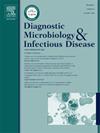Simultaneous detection of dengue virus serotypes in a dual-serotype-detection nucleic acid based lateral flow assay
IF 2.1
4区 医学
Q3 INFECTIOUS DISEASES
Diagnostic microbiology and infectious disease
Pub Date : 2025-01-06
DOI:10.1016/j.diagmicrobio.2025.116679
引用次数: 0
Abstract
Dengue virus (DENV) is an important arthropod-borne viral disease, with four antigenically and genetically diverse serotypes (DENV-1, DENV-2, DENV-3, and DENV-4). Timely and accurate diagnosis of dengue virus serotypes is crucial for the management of outbreaks. This study focussed on the development of a RT-PCR based lateral flow strip assay to detect DENV serotypes in a dual detection manner without using gel electrophoresis. The assay uses anti-biotin/streptavidin colloidal gold conjugates with fluorescent/enzymatic tagged DENV serotype specific antibodies for the direct detection of DENV infected serum samples on a nitrocellulose membrane using biotin-BSA as control line. The detection limit of the assay was up to 10 copies of cDNA for DENV-1 and 100 copies for DENV-2, DENV-3, and DENV-4. In house evaluation of DENV LFIA demonstrated 100 % sensitivity in all the serotypes compared to conventional RT-PCR, 100 % specificity for DENV-1, DENV-2, DENV-3, and 95 % specificity for DENV-4 detection. DENV serotyping was assessed in a dual detection manner (DENV-1/DENV-3 and DENV-2/DENV-4 at two test lines) on the strip. The limitation of the assay is the requirement of PCR for initial amplification and confirmation of individual serotype in case of DENV-1/DENV-3 and DENV-2/DENV-4 detection, besides the field evaluation of the assay detected DENV-2 and DENV-3 serotypes, and no other serotype was detected in line with RT-PCR findings.
双血清型检测核酸横向流动法同时检测登革病毒血清型。
登革热病毒(DENV)是一种重要的节肢动物传播病毒性疾病,有四种抗原和基因不同的血清型(DENV-1、DENV-2、DENV-3 和 DENV-4)。及时准确地诊断登革热病毒血清型对疫情的管理至关重要。本研究的重点是开发一种基于 RT-PCR 的侧流条带检测法,以双重检测方式检测 DENV 血清型,而无需使用凝胶电泳。该检测法使用抗生物素/链霉亲和素胶体金共轭物与荧光/酶标记的 DENV 血清型特异性抗体,以生物素-BSA 为对照线,直接检测硝酸纤维素膜上受 DENV 感染的血清样本。该检测方法对 DENV-1 的检测限为 10 个 cDNA 拷贝,对 DENV-2、DENV-3 和 DENV-4 的检测限为 100 个拷贝。与传统的RT-PCR相比,DENV LFIA的内部评估表明对所有血清型的灵敏度均为100%,对DENV-1、DENV-2和DENV-3的特异性为100%,对DENV-4的检测特异性为95%。在试纸上以双重检测方式(DENV-1/DENV-3和DENV-2/DENV-4在两条检测线上)评估了DENV血清型。该检测方法的局限性在于,在检测DENV-1/DENV-3和DENV-2/DENV-4时,需要进行PCR初步扩增和确认单个血清型,此外,该检测方法的现场评估检测到了DENV-2和DENV-3血清型,没有检测到与RT-PCR结果一致的其他血清型。
本文章由计算机程序翻译,如有差异,请以英文原文为准。
求助全文
约1分钟内获得全文
求助全文
来源期刊
CiteScore
5.30
自引率
3.40%
发文量
149
审稿时长
56 days
期刊介绍:
Diagnostic Microbiology and Infectious Disease keeps you informed of the latest developments in clinical microbiology and the diagnosis and treatment of infectious diseases. Packed with rigorously peer-reviewed articles and studies in bacteriology, immunology, immunoserology, infectious diseases, mycology, parasitology, and virology, the journal examines new procedures, unusual cases, controversial issues, and important new literature. Diagnostic Microbiology and Infectious Disease distinguished independent editorial board, consisting of experts from many medical specialties, ensures you extensive and authoritative coverage.

 求助内容:
求助内容: 应助结果提醒方式:
应助结果提醒方式:


